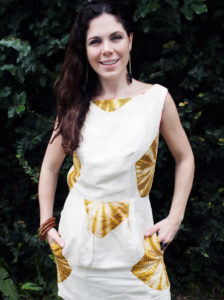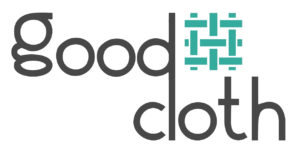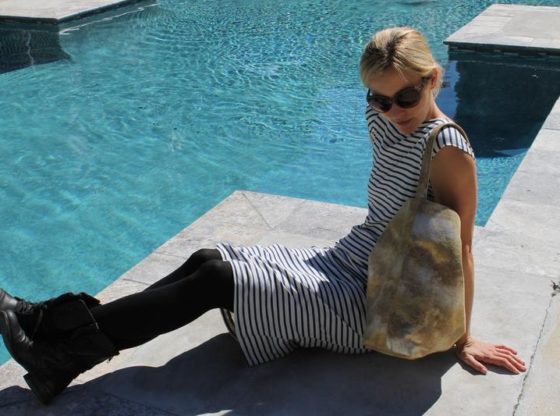Calling all fashionistas that want to look good and do good! Good Cloth wants you to be their partner in ethical fashion. Founded by Stephanie Hepburn, Good Cloth specializes in ethical fashion including clothing, accessories, and home goods that are designed with consideration for workers, the planet, and consumers. Read on to find out more about Stephanie and her New Orleans, LA-based B Corp.
 Good Cloth’s zigzag path on the road to success: “How I got here wasn’t a straight line. I have always loved fashion and wrote about it for newspapers — predominantly the Times-Picayune in New Orleans. At the same time, but entirely separately, I have written books on human rights. It was when I was writing a book on human trafficking — from 2006 to 2013 — that I began to see the underbelly of the fashion industry. In many cases, people who make clothing can’t afford basic needs such as clothing, rent, transportation, healthcare, or education for their children. Factory managers and labor brokers often exploit workers; brokers don’t pay workers and managers prohibit workers from leaving until they say so. Workers face abuse, including sexual harassment. Garment factories aren’t often up to code, resulting in disaster; year after year structural issues mixed with blocked fire exits have resulted in tragedy for apparel workers. If this sounds reminiscent of the New York City Triangle Shirtwaist Factory Fire in 1911, there’s a reason. The fire killed 146 workers because the fire-escape collapsed and firefighters’ rescue water and ladders didn’t go high enough to reach victims. The workers were immigrants and mostly women and girls, some as young as 14. More than 100 years later and across the world, in 2012, 112 garment workers died in a clothing factory fire in Dhaka, Bangladesh. The next year, the Rana Plaza garment factory collapsed, killing more than 1,100 workers and injuring thousands; again the victims were mostly women.
Good Cloth’s zigzag path on the road to success: “How I got here wasn’t a straight line. I have always loved fashion and wrote about it for newspapers — predominantly the Times-Picayune in New Orleans. At the same time, but entirely separately, I have written books on human rights. It was when I was writing a book on human trafficking — from 2006 to 2013 — that I began to see the underbelly of the fashion industry. In many cases, people who make clothing can’t afford basic needs such as clothing, rent, transportation, healthcare, or education for their children. Factory managers and labor brokers often exploit workers; brokers don’t pay workers and managers prohibit workers from leaving until they say so. Workers face abuse, including sexual harassment. Garment factories aren’t often up to code, resulting in disaster; year after year structural issues mixed with blocked fire exits have resulted in tragedy for apparel workers. If this sounds reminiscent of the New York City Triangle Shirtwaist Factory Fire in 1911, there’s a reason. The fire killed 146 workers because the fire-escape collapsed and firefighters’ rescue water and ladders didn’t go high enough to reach victims. The workers were immigrants and mostly women and girls, some as young as 14. More than 100 years later and across the world, in 2012, 112 garment workers died in a clothing factory fire in Dhaka, Bangladesh. The next year, the Rana Plaza garment factory collapsed, killing more than 1,100 workers and injuring thousands; again the victims were mostly women.
Despite the spotlight on these tragedies, not much has changed in the fashion industry. There are still brokers who traffic garment workers, managers who decide the fate of their employees, and the use of subcontracting and short-term contracts — called fixed-duration contracts, FDCs — that allow factories to avoid paying maternity and seniority benefits. Ultimately, this enables companies to say they just didn’t know that the people who made their apparel faced such horrid conditions. It’s a system that has worked for companies’ bottom lines but at a terrible cost for humans and the environment.
 Companies need to be transparent and legally responsible for their entire supply chains. Carolyn Maloney (D-NY) and Chris Smith (R-NJ) agree and put together the Business Supply Chain Transparency on Trafficking and Slavery Act of 2015 (H.R.3226/S.1968). To support the bill, people can contact their congressperson and senators. That said, what needs to develop, alongside policy change and enforcement, is a consumer conscience. In the United States, we have one surrounding recycling and littering; it’s time we have one for shopping. It’s the idea of developing a consumer conscience that propelled me to found Good Cloth; to educate consumers on the devastating impact of fast fashion and provide sustainable alternatives to people looking to shop with complete transparency. We work with individuals and groups across the globe, many of whom are women, to support their efforts to make artisan clothing and accessories with safe dyes, environmentally sound practices, and transparency in all parts of the process. Our efforts help these artisans to stay out of poverty and out of sweatshops.
Companies need to be transparent and legally responsible for their entire supply chains. Carolyn Maloney (D-NY) and Chris Smith (R-NJ) agree and put together the Business Supply Chain Transparency on Trafficking and Slavery Act of 2015 (H.R.3226/S.1968). To support the bill, people can contact their congressperson and senators. That said, what needs to develop, alongside policy change and enforcement, is a consumer conscience. In the United States, we have one surrounding recycling and littering; it’s time we have one for shopping. It’s the idea of developing a consumer conscience that propelled me to found Good Cloth; to educate consumers on the devastating impact of fast fashion and provide sustainable alternatives to people looking to shop with complete transparency. We work with individuals and groups across the globe, many of whom are women, to support their efforts to make artisan clothing and accessories with safe dyes, environmentally sound practices, and transparency in all parts of the process. Our efforts help these artisans to stay out of poverty and out of sweatshops.
Our mission is ‘Look Good. Do Good.’ We include product journeys for each item so that consumers can read how products are made, from beginning to end. How clothing is made shouldn’t be a mystery. What also makes Good Cloth unique is that the experience focuses on positive action and results. When on the receiving end of advocates trying to proselytize, it often feels stressful, emotionally taxing, and, frankly, depressing. That’s not what we want to do. Instead, we want to offer knowledge and incredible products so that consumers, workers, and the environment all win. We want it to be a positive experience from beginning to end.”
Disrupting the industry with sustainable fashion with an ethical conscience: “ My entrepreneurial goal is to disrupt the fashion industry and help consumers demand that companies give full transparency throughout their supply chains. I wanted Good Cloth to become B Corp Certified because I believe in giving consumers assurances that we do what we say. Saying it isn’t the same as showing it. It’s what shoppers want; in fact, 90 percent of Americans want companies to illustrate that what they are doing benefits a cause. Consumers don’t only need to have access to sustainably made products; they need to feel confident that those companies followed their mission. The B Corp certification process is rigorous and examines critical areas that match our ethos, such as strict standards of performance, transparency, and accountability.”
 Our big break with a major fashion influencer: “Nina Garcia, newly appointed Editor-in-Chief at Elle Magazine, former Creative Director at Marie Claire, and Project Runway judge, included Good Cloth twice in her Quarterly Co. subscription box. She was the momentum behind Marie Claire’s August 2017 Sustainability Issue, which included environmental heavyweights in its Sustainable-Fashion Advisory Board such as Abigail Dillen, Vice-president of Litigation for Climate and Energy at EarthJustice. The issue also hit on pollution, ever mounting billion pound landfills from discarded apparel, and highlighted that the fashion industry is the second-largest polluter after oil. Having Nina include us was and is such an honor. The more that people like Nina are ambassadors for transparency and sustainability the more that consumers consider sustainable fashion the way fashion should be.”
Our big break with a major fashion influencer: “Nina Garcia, newly appointed Editor-in-Chief at Elle Magazine, former Creative Director at Marie Claire, and Project Runway judge, included Good Cloth twice in her Quarterly Co. subscription box. She was the momentum behind Marie Claire’s August 2017 Sustainability Issue, which included environmental heavyweights in its Sustainable-Fashion Advisory Board such as Abigail Dillen, Vice-president of Litigation for Climate and Energy at EarthJustice. The issue also hit on pollution, ever mounting billion pound landfills from discarded apparel, and highlighted that the fashion industry is the second-largest polluter after oil. Having Nina include us was and is such an honor. The more that people like Nina are ambassadors for transparency and sustainability the more that consumers consider sustainable fashion the way fashion should be.”
Speak up to “B The Change”: “We open up the conversation every day. Talking to just one person can make a difference. Sometimes it only changes him or her; sometimes it has a reach beyond our wildest imagination when that person begins to talk to others.”
If you want to become a B Corp… “Don’t let yourself get bogged down with inflexible expectations. As my mom always told me growing up, ‘Rigid people break.’ I found this to ring true in business. I have had to step back more times than I can count; I’ve reexamined, made changes, and tried, tried again.”
The future of fashion within the B Corp movement: “ This way of thinking is the future. One day it won’t be a movement; it will just be. Meaning, sustainable fashion will just be called fashion and B Corporations will only be called corporations. Consumer expectations are changing and it won’t be a niche mentality.”
Follow Good Cloth on Facebook, Twitter, Pinterest, and Instagram.
About Stephanie Hepburn, Founder of Good Cloth
 Good Cloth is founded by Stephanie Hepburn, an independent journalist and author of Human Trafficking Around the World: Hidden in Plain Sight. Good Cloth specializes in ethical fashion—clothing, accessories, and home goods—that are designed with consideration for workers, the planet, and consumers. The shop curates products that are made with ethically-sourced materials and have a transparent supply chain. Style, workers’ rights, and the environment are the heart of Good Cloth. The company includes product journeys for each item, so that consumers can read how products are made, from beginning to end.
Good Cloth is founded by Stephanie Hepburn, an independent journalist and author of Human Trafficking Around the World: Hidden in Plain Sight. Good Cloth specializes in ethical fashion—clothing, accessories, and home goods—that are designed with consideration for workers, the planet, and consumers. The shop curates products that are made with ethically-sourced materials and have a transparent supply chain. Style, workers’ rights, and the environment are the heart of Good Cloth. The company includes product journeys for each item, so that consumers can read how products are made, from beginning to end.
This has been a Fantastic B Corps post, MyCorporation’s salute to the entity that gives back to business and society. Join us biweekly for a glimpse at the entrepreneurs using their small business to “B The Change” in this global movement for good.
